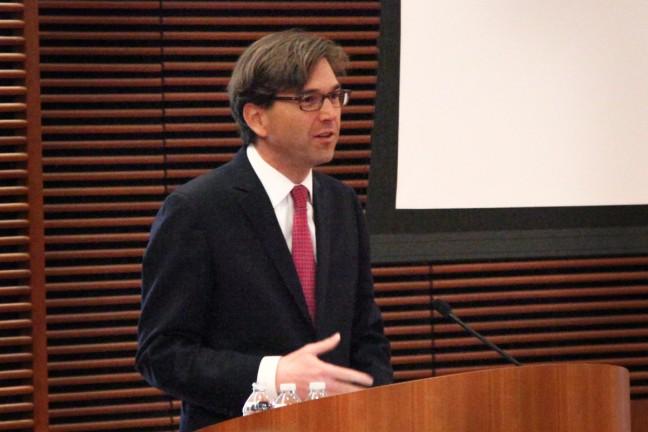Jason Furman, President Obama’s chief economist and head of the Council of Economic Advisors, spoke about the outlook for fiscal policy in an event sponsored by the Department of Economics at the Wisconsin Institutes for Discovery Monday.
Fiscal policy is imperative for the United States’ short run growth and long run potential, Furman said, adding it has an impact on everything from education and national defense to poverty and health care.
“[Fiscal policy] is also an issue that I personally had to get very deeply involved in from even before the administration began in helping the president to craft the Recovery Act, to all of the most recent fiscal issues that we have been facing,” he said.
Furman outlined three goals that need to be achieved to boost economic recovery.
Furman said the first goal is to continue returning the economy to its full potential. Furman cited research that said it usually takes about 10 years to return to the per capita gross domestic product from before the crisis, but the United States only took five and a half years to return to previous levels.
The second goal, he said, is to expand the economy’s potential growth rate. The third goal would be the “real test” for the economy, which would deal with the increase of inequality, which Furman said is due to technological change, globalization and changes in education.
He said a way to increase economic growth would be to raise the minimum wage, which has remained the same for 67 years despite increases in productivity.
Past fiscal policy provided information that helped prevent a second Great Depression, Furman said. Current policy shows the deficit is coming down “very rapidly,” which is good for sustainability, he said.
For the future of fiscal policy, there is a long-run deficit challenge, but this challenge is actually more modest compared to what a lot of people had originally feared, Furman said.
“Our biggest fiscal challenges are about the composition of spending and the composition of revenue,” he said.
Despite substantial progress coming out of the recession, there is still a lot of work to be done, he said.
The basic goal for economists is to view the national debt declining as a shared economy and remaining stable, to show the current policies are sustainable, Furman said. Attaining a sustainable fiscal policy will allow the United States to focus their resources on investment and private sector growth, rather than being forced to take escalated borrowing from future generations and abroad, he said.

















